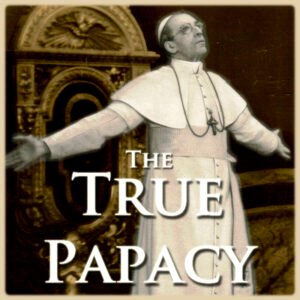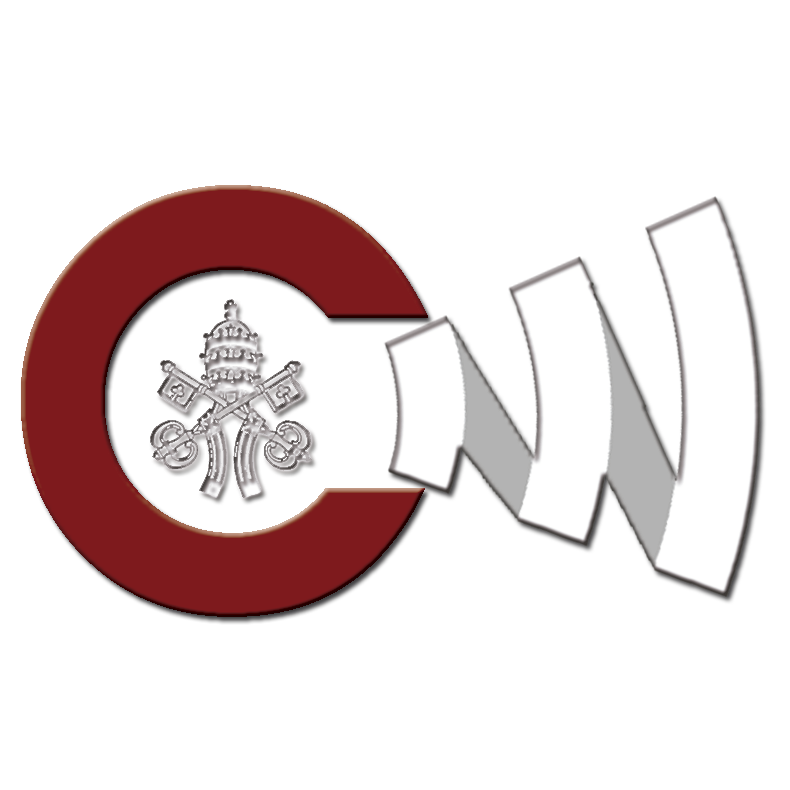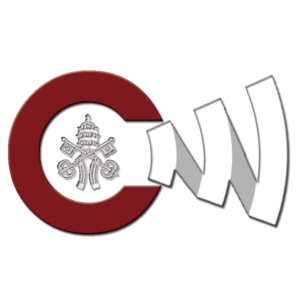The Pope, (In Latin papa, from the greek: πάππας, which means Father), is the successor of the Apostle St. Peter, and the Supreme Visible Head of the Catholic Church. In this article, we will describe his role, prove that the institution of the Papacy comes from Christ Himself, and explain that through the crisis that has decimated the Catholic Church after the Second Vatican Council, The Faithful are still able to discern whether if a claimant to the Papacy is the true Pope or not.
What is the Papacy?
The Pope, Supreme Pontiff, or Roman Pontiff, is the Bishop of Rome, and visible head of the whole Catholic Church, Christ’s Vicar on earth and his representative, and the successor of the Apostle St. Peter.
The institution of the Papacy was established by Christ himself, as we read in scriptures:
“And I say to thee: That thou art Peter; and upon this rock I will build my church, and the gates of hell shall not prevail against it. And I will give to thee the keys of the kingdom of heaven. And whatsoever thou shalt bind upon earth, it shall be bound also in heaven: and whatsoever thou shalt loose upon earth, it shall be loosed also in heaven.”
Matthew 16:18-19.
The word Peter, (In Aramaic Kephas) means Rock. As this verse and others prove, Jesus Christ established his Church as a monarchical society. He gave to his Apostles the same powers he had, as Master, Priest and King, the power to teach, to sanctify, and to rule.
“Peace be to you. As the Father hath sent me, I also send you. When he had said this, he breathed on them; and he said to them: Receive ye the Holy Ghost. Whose sins you shall forgive, they are forgiven them; and whose sins you shall retain, they are retained.”
John 20, 21-23.
This was certainly necessary, in order for Christ to perpetuate his own ministry among the future generations. However, even though Jesus-Christ gave to all his Apostles these powers, he gave only to St. Peter primacy over the rest, giving him authority over the rest of the Church, and making him his own representative, for the Apostles themselves and for all the Christians wherever they might be.
Some other verses which support the Doctrine of the Papal Primacy are:
“But I have prayed for thee, that thy faith fail not: and thou, being once converted, confirm thy brethren. “
Luke 22:32.
“Simon son of John, lovest thou me more than these? He saith to him: Yea, Lord, thou knowest that I love thee. He saith to him: Feed my lambs... He said to him the third time: Simon, son of John, lovest thou me? Peter was grieved, because he had said to him the third time: Lovest thou me? And he said to him: Lord, thou knowest all things: thou knowest that I love thee. He said to him: Feed my sheep.
John 21,15 and ff.
Can the Pope remain a Pope if he abandons the True Faith?
Before we proceed further, we must explain this point. In order for someone to be a Pope, he needs to be Catholic. Being a Pope, means being the visible head of a body called “The Catholic Church”. However, if one falls into heresy, that is, if one abandons the Catholic Faith, or denies even one of its beliefs, one is cut, by that very same sin of heresy, from the Church, and therefore is no longer part of the body.
Now, if a man is not part of the body, how will he pretend to be the head?
So the answer will be: No. If the Pope were to abandon the True Faith, he would cease to be the Pope, because he would cease to be Catholic.
But the Church teaches that when the Pope speaks “Ex-Cathedra” (meaning, “from the chair”) he cannot err in matters of faith and morals, so How could a Pope ever abandon the True Faith?
The answer is simple: If a Pope ever was to teach something against the Faith or Morals, we would have to assume that he is not really the Pope. Either because he never was a Pope in the first place, or because he has fallen into heresy in his current statement.
And the faithful will know, by comparing his authoritative statements with those of his predecesors.
Having explained that, we can proceed further with our explanation of the Papacy.
The Powers of the Pope
Some have stated erroneously that the Pope only has a prerogative of honor, or an office only of inspection or direction, but not of jurisdiction over the Church. This Doctrine was condemned by the First Vatican Council:
“If anyone says that the Roman pontiff has merely an office of supervision and guidance, and not the full and supreme power of jurisdiction over the whole church, and this not only in matters of faith and morals, but also in those which concern the discipline and government of the church dispersed throughout the whole world; or that he has only the principal part, but not the absolute fullness, of this supreme power; or that this power of his is not ordinary and immediate both over all and each of the churches and over all and each of the pastors and faithful: let him be anathema.
1st Vatican Council, First dogmatic constitution on the church of Christ, Ch. 3, V. 9
From this, and previous dogmatic teachings we see that the Pope has the following Powers:
- Full and Supreme Power of Teaching. (Jurisdiction in matters of Faith and Morals)
- Full and Supreme Power of Ruling (Jurisdiction in matters of Discipline and Government)
The Nature of the Jurisdiction of the Pope
The Jurisdiction of the Pope is:
- A Real Jurisdiction.
That is, it demands not only reverence, but obedience from all the faithful of the Catholic Church. He not only has the power to guide, but also to command. - Universal Jurisdiction.
Because it extends to all places, and to any business related to the Church, whether it be related to Faith, Morals, Discipline or government. - Direct and Episcopal.
Which is to say, he rules over the entire Church by his own authority, regardless of the consent of the local Bishop, the Pope’s authority overrules that of the Bishop. - Supreme.
Because his power is greater than that of any individual Bishop or Patriarch, or even that of all the Bishops taken collectively, (without the Pope.) - Absolutely Complete in itself.
This means that the Pope does not depend on the Bishops to exercise his power, nor is he just a sharer in the power which was given to all the Bishops collectively, but rather his power is independent of that of the Bishops.
Consequences of this Doctrine
From this Doctrine it follows, that:
- None of the Faithful, not even Bishops may censure or disobey the command of a True Pope.
- The Pope must be infallible, when it comes to matters of Faith and Morals, and he Binds the whole Church.



